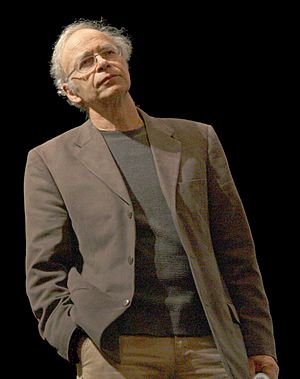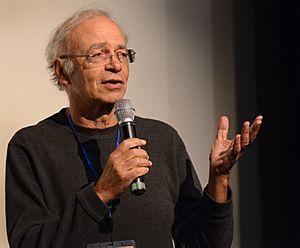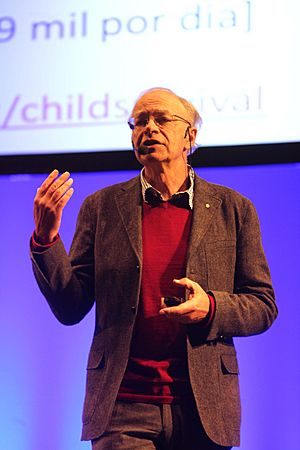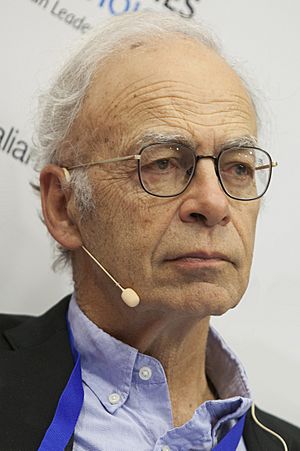Peter Singer facts for kids
Quick facts for kids
Peter Singer
AC FAHA
|
|
|---|---|
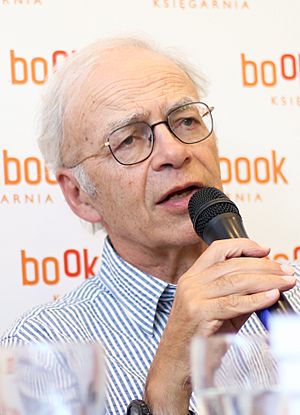
Singer in 2017
|
|
| Born |
Peter Albert David Singer
6 July 1946 Melbourne, Victoria, Australia
|
| Education |
|
|
Notable work
|
|
| Spouse(s) |
Renata Diamond
(m. 1968) |
| Awards |
|
| School | |
| Institutions |
|
| Thesis | Disobedience and democracy: a study in political obligation (1971) |
| Academic advisors | R. M. Hare (BPhil advisor) |
|
Main interests
|
|
|
Notable ideas
|
|
Peter Albert David Singer (born 6 July 1946) is an Australian moral philosopher. He is a professor of bioethics at Princeton University. Singer is known for his work in applied ethics, which means thinking about real-world moral problems. He uses a utilitarian approach, which is the idea that the best action is the one that creates the most happiness for the greatest number of beings.
Singer wrote the famous book Animal Liberation in 1975, where he argued for vegetarianism. He also wrote an essay called "Famine, Affluence, and Morality". In it, he argued that people have a moral duty to donate money to help the world's poor.
Singer has been recognized for his work many times. In 2004, he was named the Australian Humanist of the Year. He is also a co-founder of the group Animals Australia and started the non-profit organization The Life You Can Save.
Contents
Early life and education
Peter Singer was born in Melbourne, Australia, on July 6, 1946. His parents were Austrian Jews who moved to Australia in 1938 to escape Nazi Germany. His grandparents on his father's side were taken by the Nazis and never heard from again. His grandfather on his mother's side, David Ernst Oppenheim, was a respected educator who was killed in a concentration camp.
Singer was raised in a non-religious family. His father ran a business that imported tea and coffee. After high school, Singer studied law, history, and philosophy at the University of Melbourne. He decided to focus on philosophy after having interesting discussions with his sister's boyfriend.
He later received a scholarship to study at the University of Oxford in England. While at Oxford, Singer had an experience that changed his life. He was having lunch with a fellow student, Richard Keshen, who chose a salad because the spaghetti sauce had meat in it. Singer asked him why he avoided meat, and Keshen explained his ethical reasons. Singer had never met a vegetarian who explained it so clearly. This led him to become a vegetarian himself.
Career as a professor
After teaching at the University of Oxford for three years, Singer returned to Melbourne in 1977. He worked there for most of his career before moving to Princeton University in 1999. He retired from Princeton in 2023.
Many people consider Singer to be one of the most well-known and influential philosophers alive today. He is known for writing about difficult topics in a way that many people can understand.
Main ideas in applied ethics
Singer's book Practical Ethics (1979) is one of his most important works. In it, he looks at many moral issues, such as equality, world poverty, and how we treat animals.
His main idea is the principle of equal consideration of interests. This means that we should give equal weight to the similar interests of all beings. For Singer, the key thing that gives a being interests is sentience, which is the ability to feel pain or happiness. This includes many animals, not just humans.
Helping people in poverty
Singer's ideas helped start the effective altruism movement. This is the idea that we should not only try to do good, but do it in the most effective way possible. He argues that people in wealthy countries have a moral duty to donate some of their money to help people in extreme poverty.
To explain this, he uses the "drowning child analogy". He asks you to imagine seeing a child drowning in a shallow pond. You could easily save the child, but it would ruin your expensive shoes. Most people would agree that you should save the child, because a human life is much more important than shoes. Singer says that we are in a similar situation with global poverty. We can save lives by donating to effective charities, and the money we give up is far less important than the lives we save.
His organization, The Life You Can Save, recommends charities that are proven to be highly effective at helping people in extreme poverty.
Animal rights and speciesism
Singer's 1975 book, Animal Liberation, has been very influential in the modern animal rights movement. In the book, he argues against "speciesism". This is the idea that humans are better than other animals simply because they are human. Singer believes this is a form of prejudice, similar to racism.
He argues that all sentient beings, or beings that can feel pain, deserve to have their interests considered. This is why he argues for vegetarianism and against factory farms, where animals often suffer. He also criticizes most forms of animal testing.
Singer himself has been a vegetarian since 1971. He says he is now "largely vegan but a flexible vegan." This means he does not buy non-vegan products for himself, but might eat vegetarian food when traveling or at someone else's home. He has said that eating meat could be acceptable if the animals have good lives and are killed humanely.
Other views
Political ideas
While a student, Singer protested against the Vietnam War. He later became a founding member of the Victorian Greens, an Australian political party focused on environmental issues. He has run for office twice for the Greens.
Singer has written about how politics should adapt to what we know about evolutionary biology. He says that while humans may have natural selfish tendencies, we also have a strong ability to cooperate. He believes society can be set up to encourage people to help each other.
He has criticized the United States for buying oil from countries with unfair governments, which he says helps keep people in poverty. He believes wealthy nations should give more in foreign aid.
Singer does not call himself anti-capitalist. He thinks that a regulated capitalist system with a strong welfare system is the best we have found so far for meeting human needs.
Religion
Singer is an atheist. He has debated with religious leaders and thinkers. He points to the problem of evil as a reason he does not believe in an all-powerful and all-good God. He asks why a good God would create a world with so much suffering, including the suffering of animals from natural disasters.
Recognition and awards
Singer has received many honors for his work.
- In 2012, he was appointed a Companion of the Order of Australia, one of the country's highest honors.
- In 2016, he received an award from Philosophy Now magazine for his work in the Fight Against Stupidity.
- In 2021, he won the $1-million Berggruen Prize. He chose to give all the prize money away to charities, including his own foundation and organizations that fight against factory farming.
- In 2022, he received the BBVA Foundation Frontiers of Knowledge Award.
Personal life
Singer married Renata Diamond in 1968. They have three daughters. His wife, Renata Singer, is also a writer and has worked with him on some publications.
See also
 In Spanish: Peter Singer para niños
In Spanish: Peter Singer para niños
- Animal liberationist
- Argument from marginal cases
- Demandingness objection
- Intrinsic value (animal ethics)
- List of animal rights advocates
- J. Howard Moore
- Utilitarian bioethics
- Veganism
 | Lonnie Johnson |
 | Granville Woods |
 | Lewis Howard Latimer |
 | James West |


